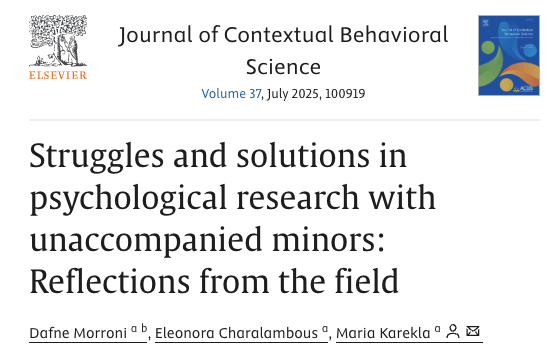Journal of Contextual Behavioral Science (JCBS)
Volume 37, July 2025
Authors
Dafne Morroni, Eleonora Charalambous, & Maria Karekla
Key Findings
- Barriers include challenging settings, staff collaboration, and interpreter bias.
- Solutions include training, education and support for all professionals involved.
- The Consolidated Framework for Implementation Research is a valuable framework.
- Contextual behavioral science and global mental health implications.
- Researchers and clinicians require patience, perseverance, and partnership.
Abstract
Background
In 2022, 22,182 individuals applied for asylum in Cyprus, of whom 941 were Unaccompanied Minors (UM).
Objectives
A cluster randomized controlled trial (RCT) examining Acceptance and Commitment Therapy with UM was carried out in shelters in Cyprus. The purpose of this paper is to present struggles and solutions from the RCT and to provide recommendations to clinicians and researchers working with UM.
Method
Obstacles faced in setting up the study and throughout research with UM were recorded systematically and resolved in team meetings. The Consolidated Framework for Implementation Research (CFIR) was applied to present the struggles and solutions.
Results
Akin to established literature, the authors faced several challenges including: UM hesitancy regarding written consent, language and cultural barriers, interpreter bias, difficulties engaging social workers, demanding circumstances in shelters and methodological issues concerning collection of quantitative self-report measures. Solutions included: replacing written consent with child assent, cultural and language adaptation required with material provided in booklets, providing psychoeducation to interpreters prior to an intervention, training social workers in the treatment protocol, building rapport with shelter staff, using tablets for data collection and shorter battery of questionnaires.
Conclusions
It is evident that carrying out research in refugee settings requires flexibility and adaptability. Findings from this study inform future intervention efforts and provide both researchers and clinicians with a framework to guide and support their work.
